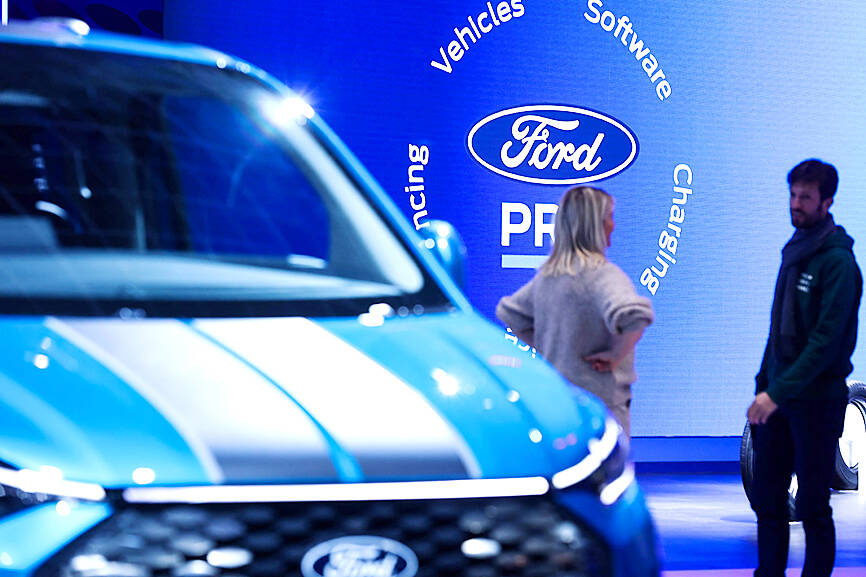Ford Motor Co plans to cut about 3,200 jobs across Europe, following workforce reductions in the US as the automaker slashes costs in a shift toward electric vehicles (EVs).
A majority of the affected positions are concentrated in Germany, affecting roles in product development and administrative areas, the IG Metall union said on Monday after an extraordinary works council meeting at the carmaker’s factory in Cologne. The cuts would affect roughly 65 percent of development jobs in Europe.
Development activities in Germany are set to be relocated to the US, according to an IG Metall statement.

Photo: AFP
The European cutbacks come after Ford already eliminated 3,000 jobs primarily in the US in the second half of last year. Ford chief executive officer Jim Farley is targeting US$3 billion in cuts as he seeks to boost profits from traditional internal combustion engine models to help finance the US$50 billion he is pouring into developing electric vehicles.
Ford declined to confirm the cuts in Europe with a spokesman saying that “no decisions have been made.”
The US carmaker has been revamping its European presence, after struggling to maintain market share for its lineup of passenger cars amid disappointing returns. Its local commercial-vehicle making arm has been a bright spot.
Ford employs about 4,600 people at the Saarlouis plant in Germany, where the company will cease making the Focus model by 2025, with no plans to produce any other cars there after that. The company is seeking alternatives for the site, while sticking with a US$2 billion planned EV investment at its key European production site in Cologne, where Ford has about 14,000 workers.

SEEKING CLARITY: Washington should not adopt measures that create uncertainties for ‘existing semiconductor investments,’ TSMC said referring to its US$165 billion in the US Taiwan Semiconductor Manufacturing Co (TSMC, 台積電) told the US that any future tariffs on Taiwanese semiconductors could reduce demand for chips and derail its pledge to increase its investment in Arizona. “New import restrictions could jeopardize current US leadership in the competitive technology industry and create uncertainties for many committed semiconductor capital projects in the US, including TSMC Arizona’s significant investment plan in Phoenix,” the chipmaker wrote in a letter to the US Department of Commerce. TSMC issued the warning in response to a solicitation for comments by the department on a possible tariff on semiconductor imports by US President Donald Trump’s

The government has launched a three-pronged strategy to attract local and international talent, aiming to position Taiwan as a new global hub following Nvidia Corp’s announcement that it has chosen Taipei as the site of its Taiwan headquarters. Nvidia cofounder and CEO Jensen Huang (黃仁勳) on Monday last week announced during his keynote speech at the Computex trade show in Taipei that the Nvidia Constellation, the company’s planned Taiwan headquarters, would be located in the Beitou-Shilin Technology Park (北投士林科技園區) in Taipei. Huang’s decision to establish a base in Taiwan is “primarily due to Taiwan’s talent pool and its strength in the semiconductor

Industrial production expanded 22.31 percent annually last month to 107.51, as increases in demand for high-performance computing (HPC) and artificial intelligence (AI) applications drove demand for locally-made chips and components. The manufacturing production index climbed 23.68 percent year-on-year to 108.37, marking the 14th consecutive month of increase, the Ministry of Economic Affairs said. In the first four months of this year, industrial and manufacturing production indices expanded 14.31 percent and 15.22 percent year-on-year, ministry data showed. The growth momentum is to extend into this month, with the manufacturing production index expected to rise between 11 percent and 15.1 percent annually, Department of Statistics

An earnings report from semiconductor giant and artificial intelligence (AI) bellwether Nvidia Corp takes center stage for Wall Street this week, as stocks hit a speed bump of worries over US federal deficits driving up Treasury yields. US equities pulled back last week after a torrid rally, as investors turned their attention to tax and spending legislation poised to swell the US government’s US$36 trillion in debt. Long-dated US Treasury yields rose amid the fiscal worries, with the 30-year yield topping 5 percent and hitting its highest level since late 2023. Stocks were dealt another blow on Friday when US President Donald